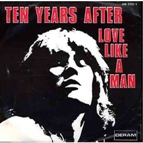Many musicians have nicknames that you instantly recognise them by. If I said Slowhand, apart from thinking of a Pointer sisters song, you’d think of Eric Clapton, ditto The King of Rock & Roll, Elvis should be your first thought, but how many would know who Captain Speedfingers is?
When I tell you it was Ten Years After’s lead singer and guitarist, Alvin Lee, there will be a lot of people under a certain age who would still be none the wiser as they only ever had one UK hit and you hardly ever heard on the radio.
Alvin was born Graham Barnes in Nottingham in 1966 and whilst growing up learned the clarinet, that was until he discovered his dad’s very large blues collection and then decided to pick up a guitar. In 1960 he formed a local band called The Atomites. Soon they recruited another member called Ivan Jay and thus changed their name to the Jaymen. In 1962, like the Beatles, they managed to secure a spot at the Star Club in Hamburg. Within a few weeks their drummer quit and they had to return home. Almost immediately they recruited a new drummer by the name of Dave Quickmire and then returned to Hamburg as the Jaybirds.
Later the same year, Alvin received an invitation from Joe Meek to join the Outlaws but he declined citing that he wanted to remain in Germany and gain more exposure with the Jaybirds. Things didn’t quite work out that way and the band returned to the UK for good in 1965. Quickmire then quit and was soon replaced by Ric Lee, but to heighten their profile, they bowed to pressure and moved to London.
Their luck changed in London when they landed themselves a job as the house band for the stage production of Alan Sillitoe’s play Saturday Night and Sunday Morning. They weren’t originally sure what to do, but Leo Lyons, their bass player recalled, “The play ran for six weeks and then we were faced with two alternatives, either we return to Nottingham or accept work as a backing band and hang around in the hope we could get work on our own.”
The latter paid off, as they managed to secure a daytime gig recording demo discs for the publishing company, Southern Music. Whilst there, they met the Ivy League who liked their sound and invited them on tour from November 1966. For that tour their roadie, Chick Churchill became their keyboard player and they met a young agent called Chris Wright who took them under his wing, became their manager and suggested a name change firstly to Blues Trip and then to Blues Yard which was just in time for the residency he secured them at the Marquee Club. In 1968, Wright founded the Chrysalis record label and took the group with him.
Their final name change came after Lyons was reading a newspaper article that carried the line ‘Ten years after the Russian Revolution…’ That name was well received by all members and just in time for them to perform to 20,000 people at the Windsor Jazz & Blues Festival.
Love Like A Man was the group’s fourth single release and their only one to chart in the UK. It was taken from their fifth album Cricklewood Green. In the States it reached a lowly number 98 but it was the follow-up, I’d Love to Change the World, which reached number 40 that they are best remembered over there for.
Unusually the A-side of this single is played at 45rpm whilst the B-side is played at 33rpm and although early copies of the single don’t state it, the B-side is a live version of the song recorded at Bill Graham’s Fillmore East and runs to a lengthy 7mins 56secs. The A-side is edited to just over three minutes.
Lee later recalled that their appearance at Woodstock was, “The beginning of the end.” It was a tedious and miserable era knocking out what he called ‘clever tricks’ to hockey stadium audiences. In 1973 he teamed up with a gospel singer called Lyon LeFevre, George Harrison, Steve Winwood and Ron Wood for the album On the Road to Freedom, this album sparked desires within Lee to change musical direction and by 1974 Ten Years After were no more.
All through the glam and punk era he kept turning out solo albums, in fact over the next 30 years there were over 20 solo albums. One that stands out is 2004’s In Tennessee where he got to play with DJ Fontana and Scotty Moore, Elvis Presley’s original drummer and guitarist respectively.
His last album came in 2012 with Still On The road To Freedom. The track that closes the album is Love Like A Man – Part 2. When asked, just before his death in March this year, why he revisited that song, he replied, “I liked the rhythm and the song fitted, just jumped out of my head.”
